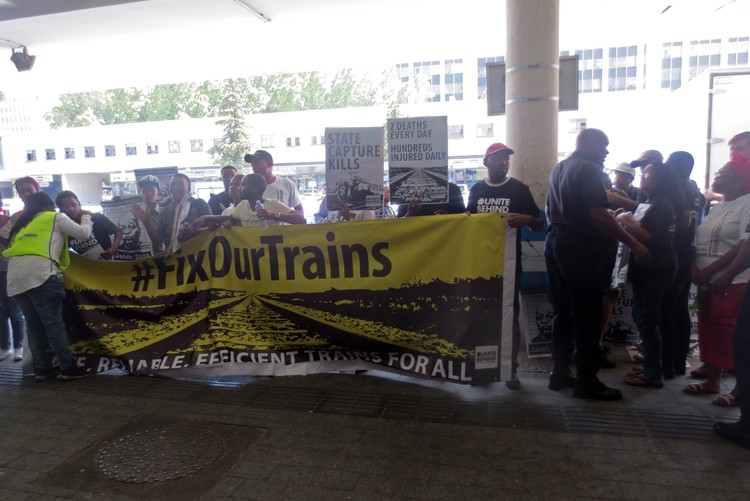Metrorail Central Line to operate again after PRASA promises better security
Union and management reach a deal
Cape Town’s Central Line is to begin operating on Wednesday afternoon after the United National Transport Union (UNTU) and Passenger Rail Agency of South Africa (PRASA) reached a deal on train safety.
UNTU members had refused to work on the Metrorail’s Central Line — which transports people to the major Cape Flats townships, including Khayelitsha — after a security guard was murdered on the line earlier this month. Service on the Central Line was consequently suspended.
According to an UNTU statement, in a deal struck at 9pm on Tuesday, PRASA agreed to have two police officers escorting train drivers, two police officers escorting the Metrorail guard, a police officer in the middle cab as backup, armed guards at turn-around stations and “hot spot” stations such as Netreg, Bonteheuwel, Heideveld, Nyanga and Langa.
Also, containers will be placed at the notorious Bonteheuwel split with armed guards or police officers 24 hours a day, seven days a week. Vehicles will be placed on the railway’s service roads within 30 days. Missing signals will be replaced and made operational within 90 days.
Steve Harris, General Secretary of UNTU, said that if PRASA or the police failed to adhere to the agreement, the train service on the Central Line would be suspended again. He noted that five workers had been killed on the line recently “because basic security measures were not met”.
Protesters removed from Cape Town station
The agreement was reached hours before a meeting on Wednesday at PRASA’s offices at Cape Town station to discuss, among other things, security on the trains. A couple of dozen UniteBehind protesters entered the meeting and handed over a letter calling for the dismissal of PRASA Rail CEO Mthuthuzeli Swart and an emergency safety plan for the Central Line.
Activist Zackie Achmat said UniteBehind wanted action against incompetent Western Cape management and prosecution of all corrupt people at PRASA.
After leaving the meeting the protesters sang outside. A large contingent of PRASA security guards then came to remove them.
GroundUp saw the guards threaten the protesters and then physically remove them from the station. Our reporter was also threatened and told not to take photos or interview the protesters.
Next: Students turned away at Unisa Pietermaritzburg campus
Previous: “Walking bus” volunteers help Nyanga learners get safely to school
Letters
Dear Editor
A few things come to mind after reading your story. The first is that there does not seem to be any mention of SATAWU being present at this meeting to voice their concern. After all their motto is "an injury to one is an injury to all".
Secondly UNTU (previously UTATU) has always been at the forefront regarding safety for its members. In fact one has to go back as far the 80s or 90s when they were known as the ASA and then TWU. They have always campaigned for safety of their members in the rail sector but the situation does not change.
People are still getting killed on our trains. Is it endemic in our DNA or is it a "fat cat" attitude of how much can I steal from my employer? Given the recent corruption scandals, I would think it is the latter. It's time for sweeping change at the top to enable the PRASA workforce to provide a service that is being overtaken by the taxi industry.
Reading about protestors being removed by the very guards who should be protecting the commuters is a reflection on the non-existent PRASA management who have clearly lost the plot.
0832831783
CAPE TOWN
© 2018 GroundUp. 
This article is licensed under a Creative Commons Attribution-NoDerivatives 4.0 International License.
You may republish this article, so long as you credit the authors and GroundUp, and do not change the text. Please include a link back to the original article.



